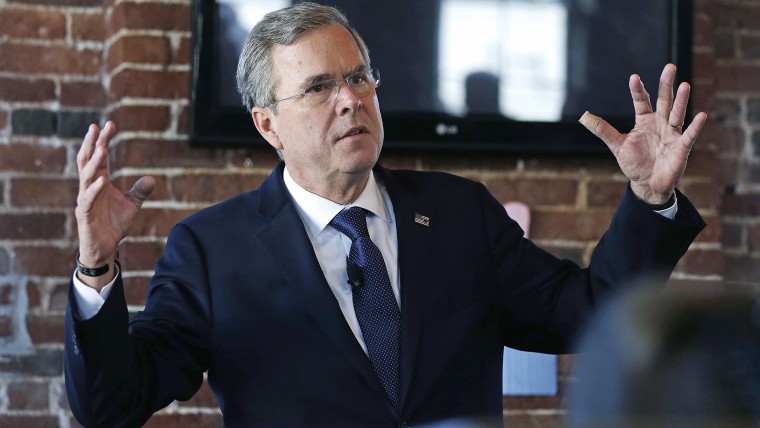Jeb Bush was asked the other day about his faltering favorability rating among Republican voters. "Hell if I know," the presidential candidate replied. "I don't really care."
And at a certain level, that's probably about as a good reply as any. After all, the underlying question -- why don't voters in your own party like you? -- is inherently brutal and insulting. Dismissing it as an unimportant distraction makes sense, if only to maintain one's self-esteem.
Former Florida Gov. Jeb Bush's image among Republicans has steadily worsened over the past five-and-a-half months. His current net favorable rating of -1 (44% favorable, 45% unfavorable) among Republicans is significantly lower than his +27 (54% favorable, 27% unfavorable) rating in mid-July. [...] Bush's campaign efforts since July have clearly moved his image in a negative direction. The percentage of Republicans with a favorable opinion of Bush has dropped 10 percentage points, while the percentage with an unfavorable opinion has increased 18 points.
Of the nine GOP presidential candidates included in Gallup's survey, Bush is the easily the least liked and the only candidate whose unfavorable scores are higher than his favorable scores. (Ted Cruz fares the best on net favorability, followed by Ben Carson.)
What's more, it's not just Gallup. As Rachel noted on the show last night, Bush has the lowest favorability scores in New Hampshire of any Republican candidate, and the lowest favorability scores in Iowa of any GOP presidential hopeful.
Ordinarily, when a national operation faces these kinds of numbers, Campaign Management 101 says a candidate can improve his or her favorability by running ads and hitting the campaign trail.
But therein lies the rub: Jeb Bush launched his exploratory committee in December 2014 -- which means he's now effectively been a candidate for over a year. He was already well known before that, by virtue of his high-profile political family, making the former governor one of the most widely known GOP candidates in the crowded field.
He and his allies have also spent almost comical amounts of money on campaign advertising, and for months, most of the commercials were positive, biographical spots intended to make Bush more popular.
And yet, here we are. Republican voters aren't just skeptical about voting for Jeb; they also just don't seem to like him very much. It's a problem for which there is no obvious solution.
It's nearly mid-January, and all available evidence suggests the party's base isn't buying what Bush is selling. How he intends to improve his standing is a complete mystery.
